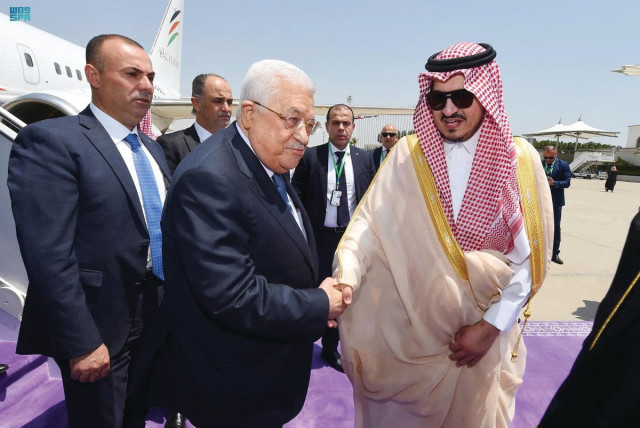US tells Israel not to ignore Palestinians as PM lauds Saudi progress

Haim Katz is the first Israeli minister to publicly attend a global conference in Saudi Arabia, which does not have diplomatic ties with Israel.
NEW YORK – The US warned Israel that a “significant Palestinian component” would be part of any normalization deal with Saudi Arabia as Prime Minister Benjamin Netanyahu lauded the pending agreement as proof his country could make peace with the Arab world prior to resolving that conflict.
“One of the things... we have communicated... to our Israeli counterparts is that there will have to be a significant Palestinian component of any final agreement,” State Department spokesman Matthew Miller told reporters in Washington on Tuesday.
“The Saudi Arabian government has made that clear publicly, they’ve made it clear to us privately,” he stated.
In his comments at the start of the weekly government meeting on Wednesday, however, Netanyahu touted a pending Saudi deal without mentioning any gestures Israel might make to the Palestinians.
“We are committed to working to expand the circle of peace, to secure peace with Saudi Arabia,” Netanyahu stated.Israeli-Saudi ties are advancing in an unthinkable manner, Netanyahu said, as he optimistically described how a normalization deal between the two countries was in Israel’s grasp.
“You are seeing things that could not even be imagined several years ago,” Netanyahu said as he referenced Tourism Minister Haim Katz’s historic visit to Riyadh to attend a United Nations World Tourism Organization (UNWTO) summit.
Katz is the first Israeli minister to publicly attend a global conference in Saudi Arabia, which does not have diplomatic ties with Israel.
“Yesterday, an Israeli minister – our colleague Haim Katz – landed in Saudi Arabia, and there will be additional visits soon,” Netanyahu said.
His remarks alluded to an upcoming trip to Riyadh by Communications Minister Shlomo Karhi and Knesset Economic Affairs Committee chairman MK David Bitan for the Exceptional Posts Conference.
In addition, Netanyahu said, “We have been flying over Saudi Arabia for several years now, and we are talking about linking infrastructure. All of this sounds imaginary; it is not happening by itself.”
He recalled that his speech to the UN General Assembly in which he spoke about how both countries were on the cusp of history was for the first time broadcast live in Saudi Arabia.
“This is a sign of the times,” Netanyahu said.
He credited the change to his philosophical belief that Israeli-Arab peace must be divorced from the resolution of the Israeli-Palestinian conflict.
Israel-Saudi ties are advancing, Netanyahu said, “because we needed to spend years fighting against the concept and convincing many... especially in the US, to bypass the Palestinian veto, which said that until we capitulated to the Palestinians’ diktat, and achieved a peace agreement with the Palestinians... it would be impossible to break through to the Arab world.”
“We needed to break through this,” he added.
Part of the advancement to a Saudi deal was due to Israel’s economic and technological prowess as well as to the 2020-2021 US-backed Abraham Accords under whose auspices four Arab countries agreed to normalize ties with Israel, Netanyahu stated.
During his conversation in the US last week with President Joe Biden, Netanyahu said, they mainly focused on expanding the circle of peace.
“The conversation was due to take place for a few minutes in a small forum and then in an expanded one. What happened was that the conversation continued for an entire hour, privately.
“The conversation was good and very friendly, between two people who have known each other for many years,” he emphasized.
He promised that he would move forward on the deal while “scrupulously safeguarding” Israel’s “vital interests… especially security,” Netanyahu said.
Saudi-Palestinian relations
In Ramallah on Wednesday, Palestinian Authority Prime Minister Mohammed Shtayyeh spoke of the growing ties between his government and Saudi Arabia.
On Tuesday, the PA credentialed the first Saudi ambassador, Nayef Al-Sudairi. He will be a non-resident envoy stationed in Jordan and is also considered to be the Saudi Consul General in Jerusalem.
Both Saudi Arabia and the PA consider east Jerusalem to be the future capital of a Palestinian state.
Shtayyeh met with Sudairi on Wednesday and said, “We are happy with the pioneering and advanced Saudi role in the region and the world, because this pushes the Palestinian cause forward, amid a state of international double standards,” according to a statement posted on the official Palestinian news agency WAFA.
The Saudi position is exceptionally clear when it comes to the Palestinian issue and the importance of the Arab Peace initiative, Shtayyeh said, as the 2002 plan for a two-state solution based on the pre-1967 lines. That plan calls for normalized Israeli-Arab ties only after an agreement is reached for a two-state solution to the Israeli-Palestinian conflict.
Sudairi said the Arab Peace Initiative is the focal point of any future peace process, according to WAFA.
Jerusalem Post Store
`; document.getElementById("linkPremium").innerHTML = cont; var divWithLink = document.getElementById("premium-link"); if (divWithLink !== null && divWithLink !== 'undefined') { divWithLink.style.border = "solid 1px #cb0f3e"; divWithLink.style.textAlign = "center"; divWithLink.style.marginBottom = "15px"; divWithLink.style.marginTop = "15px"; divWithLink.style.width = "100%"; divWithLink.style.backgroundColor = "#122952"; divWithLink.style.color = "#ffffff"; divWithLink.style.lineHeight = "1.5"; } } (function (v, i) { });

